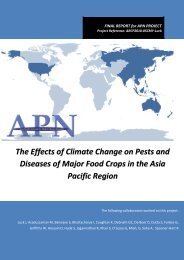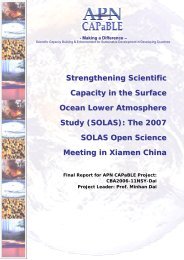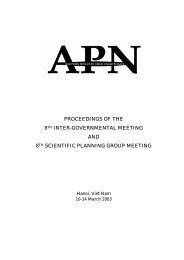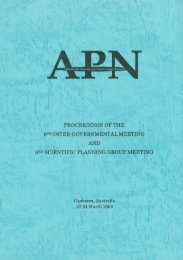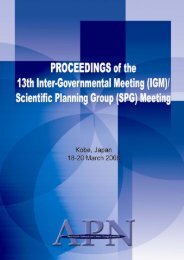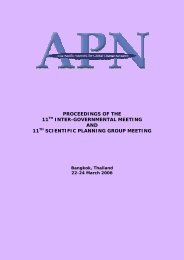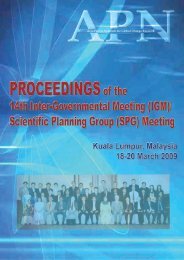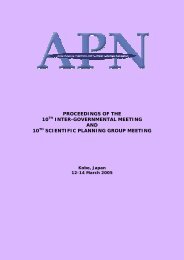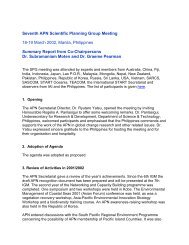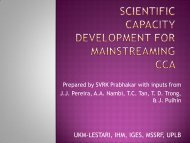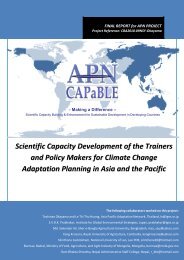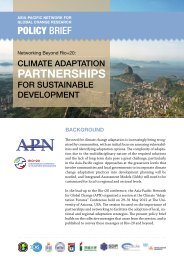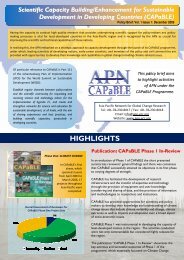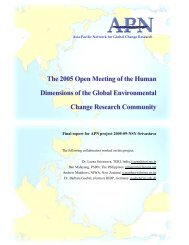APN Newsletter - Asia-Pacific Network for Global Change Research
APN Newsletter - Asia-Pacific Network for Global Change Research
APN Newsletter - Asia-Pacific Network for Global Change Research
You also want an ePaper? Increase the reach of your titles
YUMPU automatically turns print PDFs into web optimized ePapers that Google loves.
TOKYO STATEMENT<br />
4 April 2012<br />
The participants of the 5 th <strong>Global</strong> Earth Observation System of Systems (GEOSS) <strong>Asia</strong>-<br />
<strong>Pacific</strong> Symposium, hosted by the Group on Earth Observations (GEO), call upon<br />
the United Nations Rio+20 Conference on Sustainable Development to recognize the<br />
critical role of Earth observations <strong>for</strong> in<strong>for</strong>ming an economy based on Green Growth.<br />
In particular Earth observations can accelerate the transition to a green economy that<br />
promotes sustainable growth and improves human well-being by jointly pursuing<br />
economic growth and the environment with proper stewardship of natural assets and<br />
benefits of ecosystem services.<br />
Earthquakes and tsunamis, floods and droughts, ecosystem degradation and biodiver-<br />
sity loss in freshwater, coastal and <strong>for</strong>est environments, and climate change impacts<br />
endanger the security of water, food, energy, health and ecosystem services across the<br />
<strong>Asia</strong>-<strong>Pacific</strong> region today. Comprehensive, coordinated and sustained Earth observa-<br />
tions and in<strong>for</strong>mation are needed as a basis <strong>for</strong> sound decision making. Earth obser-<br />
vations also <strong>for</strong>m an integral part of regional cooperation to strengthen resilience to<br />
natural disasters and global climate change, harmonize society with nature, promote<br />
energy-security and establish a low-carbon society.<br />
The effective use of wide-ranging knowledge and experience obtained through<br />
sharing data and in<strong>for</strong>mation can support the transition to a green economy. Such<br />
data sharing will lead to the in<strong>for</strong>med allocation of land and water use, the proper val-<br />
uation and preservation of ecosystem services, and the reconciliation of environmen-<br />
tal sustainability and economic development.<br />
The Group on Earth Observations (GEO) has been advancing the <strong>Asia</strong>n Water Cycle<br />
Initiative (AWCI) and the <strong>Asia</strong>-<strong>Pacific</strong> Biodiversity Observation <strong>Network</strong> (AP-BON),<br />
and is promoting regional cooperation under the GEO <strong>Global</strong> Agriculture Monitor-<br />
ing initiative (GEO GLAM) and the <strong>Global</strong> Forest Observation Initiative (GFOI). Dis-<br />
cussions on data integration in jurisdictional waters of multiple countries have just<br />
begun including supports to/from the Intergovernmental Oceanographic Commis-<br />
sion Sub-Commission <strong>for</strong> the Western <strong>Pacific</strong> (IOC/WESTPAC) and Regional <strong>Global</strong><br />
Ocean Observing Systems in <strong>Asia</strong>-<strong>Pacific</strong> region. These projects and activities demon-<br />
strate the value of Earth observations and in<strong>for</strong>mation and will serve as a model <strong>for</strong><br />
regional cooperation, enabling scientists, practitioners, decision-makers, citizens and<br />
other stakeholders to work together towards achieving sustainable development.<br />
ARCP-Funded Projects •<br />
33<br />
ARCP-Funded Projects



